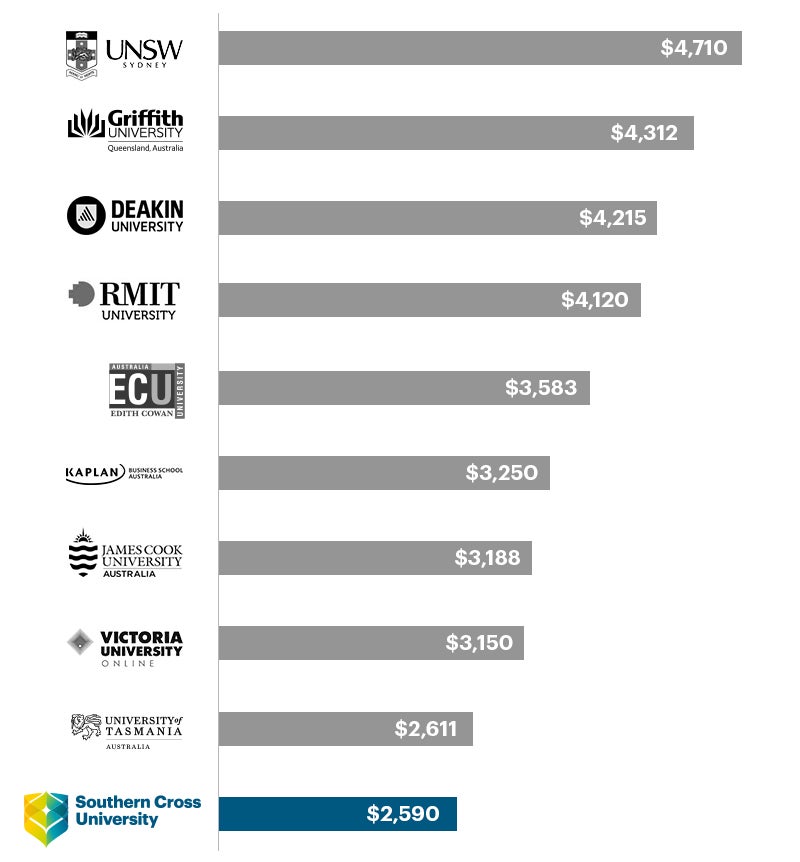Obtaining a Master of Business Administration (MBA) is an incredibly popular way to seek career progression and prove to employers that you’re ready for a promotion. That doesn’t mean that the path is an easy one.
The first step is choosing the right program for you. Most MBA students are already on a career path, so returning to study means considering lifestyle as much as academic factors. With so many programs on offer, choosing an MBA deserves your time and careful deliberation.
Why do you want to study an MBA?
Becoming a leading voice in your industry and filling an executive position doesn’t happen by accident. Companies appoint those who show great managerial skills, deep business knowledge and sustainable commitment to leadership. An MBA is one way to prove your mettle. International household names such as Tim Cook, CEO of Apple, and Satya Nadella, CEO of Microsoft, have MBAs to their name.
More locally, Sturt Eastwood, Chief Executive of Diabetes NSW says completing an MBA changed his career trajectory completely, going from humble beginnings to running the tenth largest satellite company in the world. Another example is MBA graduate Gail Kelly – once Australia’s highest-paid woman, first female CEO of a major Australian bank, and in 2010, the 8th most powerful woman in the world according to Forbes. For Gail, completing the MBA fast-tracked her career into senior management and set her up for continued success.
Perhaps you want long-term salary growth prospects, additional career opportunities, networking or you want to lay foundations for starting a business. Whatever your reasons, there are a lot of options for MBA programs, both locally and at institutions abroad. To help you decide, your first task is to think about what you want to gain from your MBA experience, and don’t be afraid to get into the details. What you hope to get out of the degree will drive your decision when choosing a program. Get it clear in your mind and you will be in the best position to make the right choice.
There is no universal ‘best’ MBA program. The choice is incredibly subjective, depending on factors such as your desired outcomes, where you are in your career, whether you have dependents and your financial constraints to name only a few.
Here are some important points to consider when you do your research:
Where should you study an MBA?

Some of the top business schools can be found on your doorstep. These institutions offer local expertise and experience along with no small amount of convenience. International MBA programs are a more expensive option, but if you want the experience of living abroad then it’s worth leaving on the table. While many courses are taught in English, you might pick up another language living in a foreign city for a year or more.
Perhaps you want to push the boat out, throw yourself out of your comfort zone or try a new scene. If this is part of the MBA experience that you prioritise, give it the appropriate weight in your decision-making process. Travelling is not for everyone. Keeping it local is not necessarily accepting ‘second best’. The programs on offer within Australia can just as easily help you achieve your career goals.
There’s also the option of not leaving home at all and choosing an online course. A lot of reputable universities both internationally and domestically now offer online MBAs with a host of specialisation choices too. Online study enables you to learn when suits you, making it easier than ever to balance study, work and family life around assignments and lectures.
University Rankings
Prospective employers can view the credentials of universities differently, so choose an institution with credibility and a proven track record. To find out where a university sits on the ladder, look for independent ranking systems like The World University Rankings which assess universities on the quality of their programs and graduate outcomes.
Accreditations
Similar to University rankings, an accreditation provides independent verification of the standard of the MBA course and can be a helpful tool to differentiate which one is right for you. For example, the European Quality Improvement System (EQIS) is managed by the Brussels-based Foundation for Management Development and is one of the major international systems of quality assessment, improvement and accreditation for business schools that provide MBA courses.
MBA Specialisations
The beauty of studying an MBA is the ability to choose a specialisation that aligns with the industry you work in or the career path you’re aspiring to. It’s important to choose a specialisation based on your skills, career goals and most importantly what you’re interested in. Another factor is the future, look at specialisations that have the potential to give you the competitive edge to leverage a promotion or pay rise.
Networks
A big part of a quality MBA program is providing variety in the classroom. Diverse backgrounds make for the most interesting and informative discussions, and lecturers with experience from a variety of industries and roles can truly make a program special. Not only can you learn from industry leaders, but you might also meet a few useful contacts to utilise after you graduate. Proximity to a financial, legal, technology or other hub means a program can easily draw on local experts. This is a big advantage if you want to specialise in a particular area.
Alumni
Find out more about the academics who will be teaching your course and the alumni network of the business school or university. Will it give you the opportunity to connect with an invaluable pool of engaged professionals? Does the business school provide networking opportunities and events? Just some of the questions to think about.
Teaching methods

All of us learn differently. The way you studied while at school or during your undergraduate years might be different from how you want to conduct your MBA too. The program you choose should reflect the combination of classroom learning, individual and group work, industry exposure and practical experience that will give you what you want from your MBA. A big part of this is flexibility.
Full-time or part-time MBA
Engaging in an MBA is a mental, financial and very personal commitment, but the program still needs to fit around your lifestyle. Perhaps you have the fortune of being able to take time off to study full time on-site, maybe you’re working full time while studying and need evening classes, or perhaps you need to study online to fit learning into your schedule. Whichever it is, you’ll need to carefully research delivery methods for the programs you like and consider how you will practically be able to complete the program. Striking a balance between the best learning methods for you and your work-life-study balance ensures you’ll be successful in the program you choose. A helpful guide is SCU’s Life Study Calculator, give it a try to work out what you can fit into your week.
Application strategy
Once you start creating a manageable list of MBA programs that suit your needs and will deliver your desired outcomes, it’s time to consider selectivity. It’s important not to falter at the point of application – take time and care with it.
If there is a program you think is perfect but you don’t quite reach the entry requirements or maybe you’re just scraping in, still put in the effort to craft a careful application. It’s good to reach for more. But in the interests of diversification, also apply to a program where you meet the selection requirements, and perhaps even one where you are above average for the program.
It’s important to remember that the program itself is only part of the journey. You will get out of an MBA what you put in. Even if you tend to perform above average for participants in a program it can be a fulfilling experience if the structure, location and format of the course is suited to your goals.
Financing your future
Higher education is a financial investment. The cost of a program could be a deal-breaker in the end. Consider a couple of things that might help you fund your study:
Speak to your manager

If you have a good relationship with your employer and plan to stay with the company for a few more years, why not broach the subject of company funding. Where the business sees a real commercial gain from your MBA, they can be willing to support you through the journey. Before you broach the subject with your employer make sure you have done your research and know exactly what you need to ask for.
Also, find out if your workplace has a professional development program or policy that you can align with. When it’s time to sit down with your employer, be prepared to pitch around the deliverables and what impact you having an MBA will mean for the business as a whole. Also be open to negotiating and choose your timing carefully with the ultimate decision-maker, make sure you have enough time to have an in-depth discussion.
FEE-HELP
Australia has a loan scheme called FEE-HELP that can provide part or full loans for higher education study. Australian citizens can access this if they are conducting study within Australia. There are conditions and potential upcoming updates to legislation for this scheme so before you apply, check out this option. At the moment, there is no loan fee for postgraduate studies.
While the cost of an MBA will vary depending on the number of units you need to complete, below is the price per unit for several Australian Online MBA Programs:

ROI of an MBA

When you consider that an MBA is a significant investment it’s also important to consider your return on investment. To calculate and compare your MBA ROI there are a few elements to think about. First look at your current salary, factor in the full cost of the MBA program and how long it will take to complete, then calculate your opportunity cost. This is the salary you forgo while you are doing your MBA plus the cost of the program. Then finally look at your expected post-MBA salary.
The good news is that MBA graduate salaries are continuing to be at a premium rate. According to the Graduate Management Admission Council (GMAC) 2018 Corporate Recruiters Survey Report, demand for MBA talent is strongest in the Asia Pacific region, where 90 per cent of employers plan to make MBA hires in 2018. The report continues to show that around the world MBA graduates continue to command a salary premium relative to direct-from-industry hires and bachelor’s degree hires. For example in the US, companies will offer a median starting base salary of US$105,000 to MBA graduates in 2018.
Research thoroughly
Anyone who begins looking for an MBA program quickly learns that it is a complex decision to make. You need to consider a lot of factors that cross from your work life into your personal life. The gains are proven, but the commitment is real. Do plenty of research into the program that you can complete to a high standard and that will get you where you need to go in your career. Take your research beyond reading course outlines and online articles too.
Talk to your colleagues and other people in your industry to see where they have embarked on further education. Ask them what their experience was and how it helped (or perhaps didn’t help) them in your industry.
Embark on a site visit to some of the institutions you want to go to. This helps you get an idea of the culture and learning environment. Online universities are increasingly common so a good way of understanding these places is to meet with current or past students, and even potential lecturers.
Getting an MBA will give you valuable foundations in effective leadership, business resilience, financial analysis, entrepreneurship and marketing. It gives you a platform to build your networks and gain invaluable insight into your industry. The returns range from a tangible increase in salary to nuanced improvement in the quality of your work and leadership. Make sure you choose a program that suits your needs, provides you with the flexibility to live your life while improving yourself and delivers value to you.
Looking to study business?
Contact an enrolment advisor to find out more about studying an online MBA on 1300 863 819.





